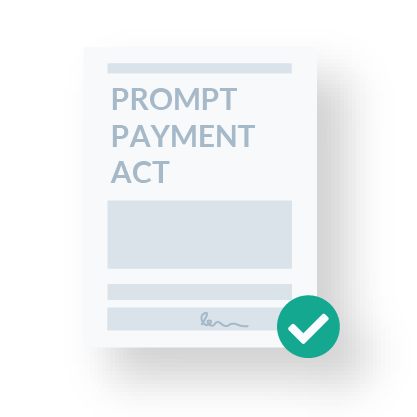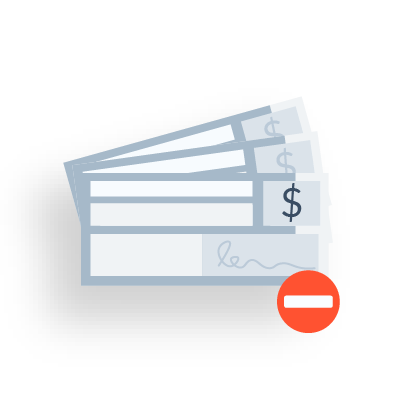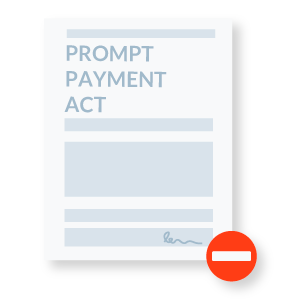
Need contract help? Put a team of legal experts in your corner.


![]()
Generally, no-lien clauses are prohibited on construction projects in Pennsylvania. However, subcontractors may waive their lien rights on residential projects prior to performance.
![]()
Pennsylvania has enforced pay-if-paid clauses as a condition precedent to payment on private projects if the terms are clear and unambiguous. If found to be ambiguous, then the clause will be treated as a pay-when-paid clause, setting a reasonable time for payment; regardless if the party has been paid by their hiring party.

Generally, payments by owners must be made within 20 days of the end of the billing cycle or receipt of invoice; whichever is later. All other payments must be made within 14 days of receipt of payment from the higher-tiered party. However, these rules act as the default in case the contract is silent as far as payment timing. Thus, the terms of the contract will govern the timing of payments on the project.

Pennsylvania does not regulate the amount of retainage withheld on private projects, the amount withheld will be governed by the contract.
![]()
Pennsylvania has enforced pay-if-paid clauses as a condition precedent to payment on public projects if the terms are clear and unambiguous. If found to be ambiguous, then the clause will be treated as a pay-when-paid clause, setting a reasonable time for payment; regardless if the party has been paid by their hiring party.

The public prompt pay laws act as the default to prime contractors on public projects. If there is no payment timing provision, then payments must be made within 45 days of receipt of a pay app. All other payments must be made within 14 days of receipt of payment, or the date of the invoice; whichever is later.

Retainage withheld on public projects is generally capped at no more than 10%, however, this may be reduced to just 5% after the project satisfactorily reaches 50% completion.
A construction contract outlines each party’s obligations, rights, and remedies on a project. But although the language in specific contract clauses is typically negotiable, Pennsylvania has certain rules that govern what the agreement must include — and what is prohibited.
Keep in mind that, while Pennsylvania’s rules for construction contract terms are written into state law, the courts determine how strictly those laws should be interpreted — and those interpretations can change.
On this page, you’ll find resources, legal information, and answers to frequently asked questions about Pennsylvania’s construction contract and payment terms requirements.
While Pennsylvania generally allows construction parties to set the terms of their agreement, there are some laws that regulate specific types of contract provisions. Any contract clause that contradicts the law is invalid and unenforceable.
“No lien” clauses
Waiving the right to file a mechanics lien in Pennsylvania, also referred to as “no-lien clauses” are generally prohibited on construction projects. However, Pennsylvania does provide a unique exceptions to this prohibition. On residential projects, defined in PA as a residential building 3 stories or less, a contractor or sub may waive their right to file a claim by a signed, written instrument, or by “any conduct which operates equitably to estop such contractor from filing a claim.”
Contingent payment clauses
Pay-if-paid clauses shift the burden of nonpayment to the subcontractor. In other words, such clauses create a condition precedent (payment from the owner) before the obligation to pay a subcontractor arises. Pennsylvania courts have enforced these types of clauses on both private and public projects, as long as the language clearly and unequivocally expresses the intent of the parties to shift the risk of nonpayment. If the clause lacks the required clarity, then it will be treated as a pay-when-paid clause.
Pay-when-paid clauses are enforceable in Pennsylvania as well, but are treated as a timing mechanism for payment, rather than a complete defense to payment. In other words, these clauses establish a “reasonable amount of time for payment,” and the underlying obligation to pay remains; regardless of whether payment was received or not.
Payment timing clauses
All private projects in Pennsylvania, with the exception of residential projects of 6 or fewer units, are regulated by PA’s prompt payment laws. Under these statutes, the timing provisions act apply as the default in cases where the contract terms are silent regarding the timing of payments. If this is the case, then payment from the owner must be made within 20 days of the end of the billing cycle, or 20 days from the receipt of the contractor’s invoice; whichever is later. All other payments down the contracting chain, when applicable, are required to be made within 14 days of receipt of payment by the higher-tiered party, or 14 days from when the invoice was received; whichever is later.
On the other hand, public projects valued at $50K or more also have prompt payment requirements, but agains, these act as the default rules when the contract is silent regarding payment schedules. If the prompt pay provisions do apply, payment by the public entity myst be made within 45 days after receipt of the contractors’ pay application. And all other payments must be made downstream within 14 days of the higher-tiered party’s receipt of payment.
Retainage limits
The amount of retainage that can be withheld on private projects in Pennsylvania is not regulated by statute. The amount that may be withheld on such projects will be dictated by the terms of the contract between the parties.
On public works projects, the amount of payments that may be withheld as retainage is explicitly capped at no more than 10% of each progress payment until the project reaches 50% completion. If satisfactory progress has been made at the 50% completion point, then the retainage withheld must be reduced to no more than 5% of the remaining progress payments. The amount withheld cannot be increased by an agreement between the parties.
Generally, Pennsylvania does not require certain provisions to be included in a construction contract, favoring the freedom of contract between the parties. However, there are some key provisions that every construction contract should include. Additionally, if the project involves improvements to residential property in PA, the Home Improvement Consumer Protection Act will apply, which does have a number of required provisions in order to be valid. These include such things as the contractor’s name, address, phone number, and registration number, cost breakdowns, estimated start and completion dates, a notice of a right to rescission, and more.
Construction contracts and payment terms are highly regulated in Pennsylvania. It can be confusing to figure out when payments must be made, how to make them, and how to best protect your company from expensive problems. Here are some frequently asked questions that come up with construction contracts and payment terms on Pennsylvania jobs.
No, “no-lien clauses” are void and unenforceable in Pennsylvania. Under 49 P.S. §1401(b) a waiver by a contractor or subcontractor is against public policy, unlawful, and void unless given in consideration for payment.” There are, however, some exceptions.
On residential projects, a contractor or sub may waive their right to file a claim in advance of performance. Furthermore, a subcontractor may waive their lien rights on a commercial project if the general contractor posted a payment bond on the project.
No, there is no specific requirement that a contract be in writing under Pennsylvania’s mechanics lien laws. However, it’s always a good idea to get an agreement in writing before starting work on any construction project.
Pay-if-Paid clauses
Pennsylvania courts have upheld pay-if-paid clauses as enforceable on both private and public construction projects. However, these clauses must explicitly state that the parties intended the clause to act as a condition precedent to payment per 73 Pa. Stat. §507(c) and 62 Pa. Con. Stat. §3933(c).
In order for a pay-if-paid clause to be enforceable, the language must be clear and unequivocal, which is based on the “plain meaning” approach of contract interpretation in Pennsylvania.
• The use of words such as “condition precedent” or “if and only if” are not enough to establish a valid pay-if-paid clause.
• If the payment clause lacks clarity, it will be interpreted as a pay-when-paid clause.
Pay-when-Paid clauses
A pay-when-paid clause merely establishes a reasonable time for payment. Therefore, the contract will be interpreted as the obligation to pay still existing, regardless if they have received payment.
Generally, no damages for delay clauses are enforceable in Pennsylvania. However, the PA courts have established two specific exceptions to their enforceability; (1) affirmative or positive interference by the owner with the contractor’s work; or (2) failure on the part of the owner to act on some essential matter necessary for the prosecution of the work. (Guy M. Cooper v. East Penn. School Dist.)
Private projects
Pennsylvania’s prompt payment laws on private projects apply to all projects with the exception of residential project of 6 or fewer units. The timing requirements act as the default payment schedule if the contract is silent in regards to the payment schedule.
On such projects, the owner must pay the GC within either 20 days after the end of the billing cycle, or after delivery of an invoice; whichever is later. All other payments myst be made within either 14 days from receipt of payment from a higher-tiered party, or delivery of an invoice; whichever is later.
Public projects
Public prompt payment laws in PA apply to all projects valued at $50K or more. Under these regulations payment periods between the public entity and the GC must be made in accordance with the terms of the contract between the parties. However, if silent, then payments myst be made within 45 days of receipt of the GC’s pay application.
All other payments must be made within 14 days of receipt of payment from the higher-tiered party. This cannot be modified by the agreement between the parties.
Private projects
The amount of retainage that may be withheld on private projects is not regulated by statute in Pennsylvania. Thus, the terms of the contract will determine how much of the total contract price may be withheld as retainage. The typical amount withheld will usually range from 5% to 15%.
Public projects
On public projects in Pennsylvania, the amount of retainage is capped at no more than 10% of the contract price. However, once the project reaches 50% completion, and satisfactory progress is being made, the retainage muse b reduced to no more than 5% of the remaining progress payments. These amounts may not be increased by the terms of the contract.
Generally, there are no specific requirements for construction contracts in Pennsylvania. However, there are very a number of requirements for home improvement contracts valued at over $500 under the PA Home Improvement Consumer Protection Act. This includes such information as:
• Contractor’s name, address, phone number, and contractor registration number;
• Total contract price or specific cost breakdowns if a time and materials contract;
• Description of work to be performed, materials used, and specs;
• Approximate start and completion dates;
• Subcontractor information known at the time of execution of the contract;
• Notice of 3-day right of rescission; &
• More.
In Pennsylvania, the statute of limitations for a breach of contract claim is 4 years from the date of the breach, regardless if the contract is oral or written under 42 Pa. Cons. Stat. §5525.
With 10% retainage being held on an electrical contract that will run through the entirety of the construction project (not completed partially through overall project.
We have a project that has been delayed for almost 2 years. We have completed our work but our warranty period does not start until.
Thank you for answering my question. I hired a contractor for 2 specific contracts on a home renovation to be done simultaneously. I paid the.
Need to file a Pennsylvania mechanics lien? File your mechanics lien with Levelset, the lien experts quickly and easily. Or you can follow the 3 steps below to file a lien yourself with Levelset's free information.